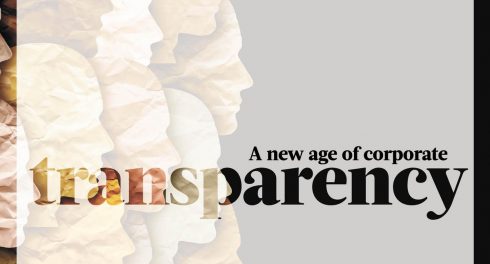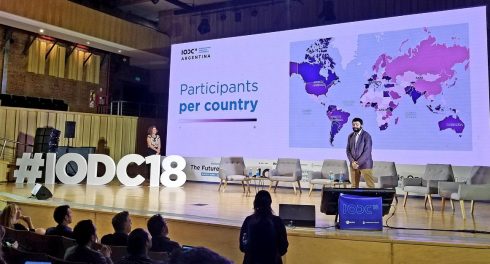Highlights
- Opening Pandora’s box
- Power rivalry ➞ transparency opportunity?
- Climate ups and downs
- Taking measure
- Do the right thing
- TAI Spotlight
Participate: TAI Communications Survey

Want to see changes in the Weekly? Want to see more from our social media? Tell us! Please take this survey to help us improve our communications. Each respondent will be entered into a random draw with one lucky winner to receive copies of the last 5 books featured in the TAI Weekly “recommended long reads.” Deadline: TODAY, October 5!
Opening Pandora’s box

Image Credit: Getty Images via BBC
Five years on, we get the Panama Papers “on steroids” – 11.9 million records implicating 35 current and former leaders and making plain how illicit wealth is hidden from law enforcement and tax authorities. Will the Pandora Papers have the same impact, or are we all so jaded that the shock factor is gone?
Certainly, you don’t have to look far for more evidence of illicit financial flows. UAE’s central bank says money-laundering services have likely grown during the pandemic as criminals exploit the use of unlicensed money service providers and growth in the e-commerce sector. The Basel Institute of Governance highlights the four things holding back global fight against money laundering drawing on their new 2021 Basel AML Index report. The Index highlights an increased risk from cryptocurrencies, so no surprise that China uses fears of money laundering to justify a crypto ban.
Part of the solution will likely lie in public beneficial ownership registers, and anti-corruption campaigners and housing advocates urge the U.S. government to pull back the veil on anonymous real estate purchases.
However, why require information if it can’t be checked? The Financial Times editorial board highlights the need for long-promised reform of Companies House and the corporate registry in the U.K. Otherwise, “scammers, kleptocrats and criminal gangs [will continue to use] UK-incorporated shell companies to launder ill-gotten gains.”
Power rivalry ➞ transparency opportunity?
The EU’s Global Gateway seeks to counter China’s Belt and Open Road, and Benjamin Barton highlights how increased contract procurement transparency and fairness in the allocation of contracts can be a major differentiator.
A similar dynamic is at play in Latin America, where Shannon K. O’Neil believes US-China rivalry provides reformers help reformers push for more transparency, accountability, and openness in commercial dealings, including those with Chinese funders. Multilateral institutions can encourage this trend, so good to see the African Development Bank reform its Independent Recourse Mechanism to strengthen accountability in lending operations.
Meantime, governance undermines key infrastructure provisions. Shadow contracts and corruption keep Iraq’s lights out as citizens face 14-hour power outages in 125-degree temps. Zuhumnan Dapel reports similar patterns in Nigeria where access is low, but user spending on electricity is high.
Climate ups and downs

Photo Source: NASA
Rodrigo Tapie explains why transparency is key to environment protection and hence why Peru should ratify the Escazu Agreement that seeks to “effectively implement…the rights of access to environmental information, [the] public participation in environmental decision-making processes and access to justice in environmental matters.”
Meantime, the upcoming COP 26 climate conference faces transparency and representation concerns, as civil society fears COP 26 exclusion due to vaccine inequity and pandemic restrictions.
Last week we flagged the violence that environmental and land defenders face, so good to see the persistence of tribal nations in the US to drag an oil firm to court – the first rights-of-nature case to be filed in a tribal court.
Despite worries of “greenflation,” a timely reminder from the IMF about how much public money is still being used to underpin fossil fuel production. Updated estimates put the global cost of fossil fuel subsidies at $5.9 trillion in 2020, up from $5.2 trillion in 2017. Around 71% of this reflects undercharging for local air pollution and global warming. Despite this, the European parliament just voted to prolong gas subsidies until 2027.
Essential Listening: 10x Bolder: The New Leadership Playbook
Hosted by the CEO of The B Team, Halla Tómasdóttir, The New Leadership Playbook is a conversation-based podcast series exploring how leaders align values with influence. Listen to the first episode here.
Taking measure
Dani Kaufmann reflects on 25 years of measuring governance with the release of the latest update of the World Governance Indicators. Striking this year, is the high variance among rich countries and confirmation of a growing governance deficit.
Staying big picture, Sarah Lister wrestles with difficult questions on the future of democracy, while Koldo Casla is optimistic that Chile’s constitutional reform will prove an opportunity to increase transparency, openness, and civic engagement in support of strengthened social services, equality, and labor rights.
A further note of optimism from Morgan Townsend, Ben Schmidt, and Hazel Leonard who argues that while COVID fraud is endemic, it sparks a renewed fight against financial crimes. Checkout early results of procurement transparency and open contracting reforms in South Africa, Italy’s new online platform, OpenCoesione, designed to provide more transparency around EU budget and funding expenditures, and Kenya implementing a record of businesses and transactions that mandates companies to disclose the beneficial owner (interesting when the President has just been linked to 13 anonymous shells companies). Plus, the unexpected rise in the use of fully virtual compliance training and audits.
Do the right thing
On the funding side, Vodafone Foundation report reveals the desire of African nonprofits to decolonize donor funding. Their report highlights key barriers to funding African CSOs and offers recommendations on how the philanthropic community can collaborate to overcome them.
Of course, many CSO leaders have been working even harder to keep organizations running during the pandemic. Exhaustion is the norm – so try these six steps to avoiding burnout.
What of hiring new talent? OpenOwnership outlines their use of a hiring platform that can help eliminate potential for bias and find the best people. As TAI is in the midst of hiring, we welcome all steers on strengthening ethical recruitment.
Other Stories
- Advertising group WPP will pay $19m SEC fine
- COST’s commitment to promoting gender-inclusive infrastructure
- Three reasons anti-corruption programs fail
TAI Spotlight
Transparency and Accountability Initiative (TAI) ‘s Executive Director, Michael Jarvis, and former TAI Steering Committee member Megan Colnar, on why setting impossible goals isn’t always a bad thing for philanthropy.
Chandler Foundation‘s CEO, Tim Hanstad shares lessons from Zambia as he explains why it is important for aid sector to support good governance.
MacArthur Foundation announced 25 exceptionally creative visionaries inspiring change as MacArthur fellows
Ford Foundation‘s President, Darren Walker, shares the foundation’s commitment to social justice, sustainability, and powering an inclusive future for all at this year’s Global Citizen Live. Also, learn how a global alliance of indigenous people and local communities fought their way to the center of global climate discussions.
Foreign Commonwealth and Development Office outlines new strategic priorities in their first annual report. Plus, don’t miss the UK government’s response to the Independent Commission on Aid Impact recommendations on international climate finance.
Job Listings
- Program Associate at TAI – October 10, 2021
- Short-term Consultant at CCSI – October 15, 2021
- Head of Africa, Open Contracting Partnership – October 15, 2021
- Program officer on Money in Politics at Piper Fund – October 20, 2021
- Director, Accountability at Human Rights First –November 18, 2021
- Program Assistant at Counterpart International – Ongoing
- Program Officer on Governance at National Democratic Institute – Ongoing
- Temporary: Project Assistant with Democratic Governance Team at National Democratic Institute – Ongoing
- Jobs at I-APS – Ongoing
- Senior Advisor on Corruption and Illicit Finance (Myanmar) at The Sentry – Ongoing
- Strategic Partnerships Intern at The Fund for Global Human Rights – Ongoing
Jobs at TAI members
- Director of Communications & Effective Philanthropy at Chandler Foundation – October 8, 2021
- Job postings at Hewlett Foundation – Ongoing
- Job postings at MacArthur Foundation – Ongoing
- Job postings at Open Society Foundations – Ongoing
- Job postings at Luminate – Ongoing
- Job postings at Ford Foundation– Ongoing
- Job postings at FCDO – Ongoing
Calls/Opportunities
- The Global Coaching Fellowship – October 25, 2021
- Board of Trustee at Integrity Action – December 31, 2021
- West Africa Civil Society Institute (WACSI) call for papers and articles – Open year-round
- Free digital security training– Ongoing
- Call for proposals: Informality, tax, and the state – Proposals accepted on a rolling basis
Calendar
- How does governance reform happen: Lessons from Nigeria – October 5, 2021 (2:00pm – 3:30 pm)
- 2021 Rule of Law Index Global launch — October 14, 2021 (10:00 am EST)
- Sustainable Territories and Participatory Democracy conference – October 20-22, 2021
- Global Investigative Journalism conference – November 3-5, 2021
- National Tax Association conference – November 18-20, 2021
- The Summit for Democracy – December 9-10, 2021
- Open Government Partnership global summit – December 13-17, 2021
- International Convention on Anti-Corruption, Good Governance, and Human Rights – April 21-22, 2022 (Boston, MA)
Want to stay updated on happenings around the TPA sector, sign up for our newsletter here



